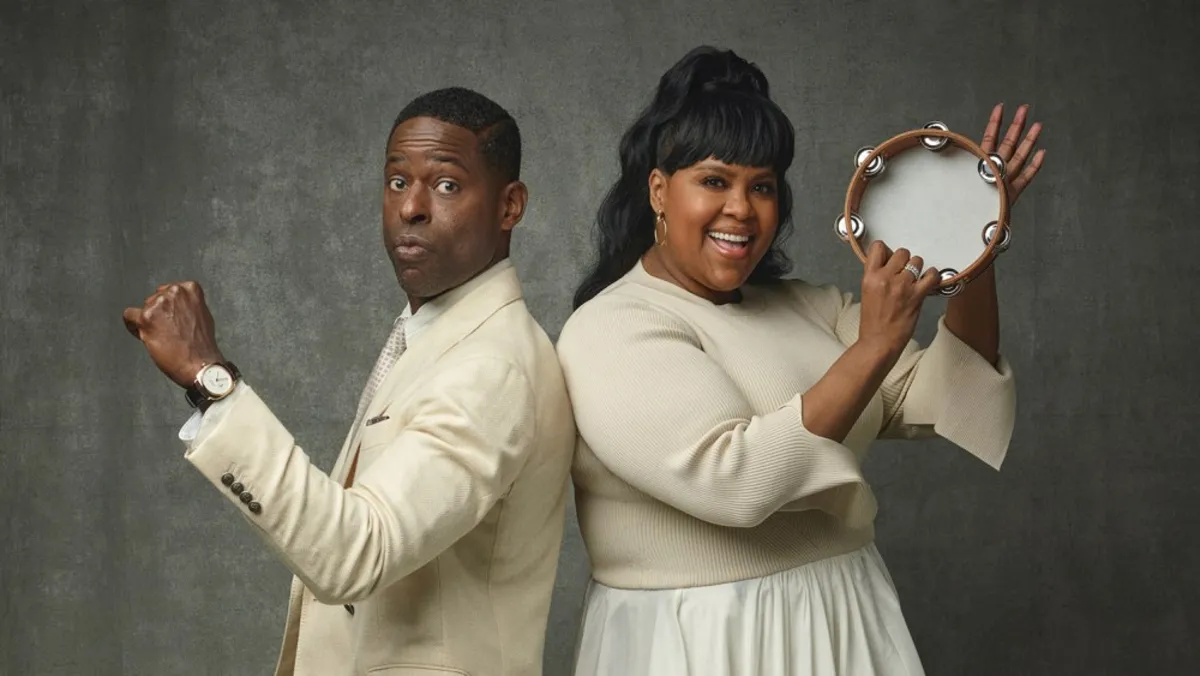
Natasha Rothwell, a beloved and fiery social media presence, is on a quest for companionship amid the chaos of global politics. The talented writer, actor, producer, and showrunner has reached a professional pinnacle this year, making a triumphant return to HBO’s acclaimed series, The White Lotus. In this highly anticipated season, Rothwell reprises her role as Belinda Lindsey, a masseuse striving to move past the broken promises made by Jennifer Coolidge’s flaky heiress in Season 1.
In a revealing discussion with fellow actor Sterling K. Brown, known for his three Emmy wins for projects like The People v. O.J. Simpson: American Crime Story and This Is Us, Rothwell shares her unsettling research into underground doomsday vaults. This topic resonates deeply with Brown, who stars in Hulu’s streaming hit, Paradise. In this show, he plays a Secret Service agent navigating life in a city-sized bunker beneath a mountain in Colorado after a catastrophic event on Earth. As he investigates the murder of the U.S. president, he also searches for signs of his missing wife.
Both Rothwell and Brown relate their experiences of survival in an industry marked by inequities and the unpredictable nature of work, both on-screen and behind the camera. Their conversation is filled with laughter and nostalgia as they reminisce about their initial meeting on Issa Rae’s groundbreaking HBO comedy, Insecure. Rothwell recalls how she started as a writer on the show, initially fearing she was in trouble for her humor. “I thought I was getting in trouble for making too many dick jokes,” she jokes, reflecting on her emotional reaction when offered the role of Kelli.
As they discuss their careers, Rothwell and Brown highlight the joy of their work amidst the serious themes they often portray. Rothwell notes the cultural significance of her character in The White Lotus and the weighty moral dilemmas she faces. “I think that Belinda saw an opportunity to get something she fundamentally believed she deserved,” she explains, touching on the complexities of her character’s decisions.
Rothwell expresses admiration for creator Mike White, who she feels opened doors for her character. “For Mike to give me Belinda was like he opened a cage that I felt the edges of,” she shares, signifying the transformative impact of being given such a role. Brown adds to this sentiment, discussing how Paradise represents a different tone from This Is Us yet showcases the artistic range of their creator, Dan Fogelman. “He’s eager to have opportunities to show the diversity of what he can do,” Brown says.
Both actors acknowledge the current challenges facing the entertainment industry, including the contraction of opportunities. Rothwell highlights the feelings of uncertainty among her peers, particularly friends in various technical roles. “I want to make sure they’re going to survive this great contraction,” she emphasizes, reflecting on the broader implications for artists and creatives.
Despite the industry's challenges, Rothwell finds joy in her work. She shares her experiences while filming in Thailand for her Hulu series, How to Die Alone, expressing relief from her usual responsibilities. “I felt like, ‘I don’t got to worry about nothing,’” she recalls, highlighting the freedom and creative space provided by her roles.
As they delve deeper into the character of Belinda, Rothwell discusses the moral complexities she faces in the latest season of The White Lotus. “I’m scared for her because I do think karma is real,” she says, contemplating the implications of Belinda’s choices and the morality of her actions. Rothwell reveals that the storyline of Belinda’s negotiation was her pitch to Mike White, showcasing her desire for the character to have agency.
Both actors reflect on personal growth and the empathy that informs their performances. Rothwell expresses her journey of self-discovery in the industry, wanting to break free from the confines of being labeled solely as a comedic actress. “I think for the longest time, I thought it meant something,” she shares, revealing her struggle to be seen as a multifaceted artist.
As their conversation wraps up, Rothwell and Brown celebrate the resilience and strength of artists amidst uncertainty. They share a profound understanding of the complexities of their craft while acknowledging the evolving landscape of the entertainment industry. With their unique perspectives and shared experiences, they continue to inspire audiences and each other through their work.